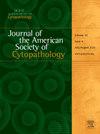细胞学检测错配修复缺陷/微卫星不稳定性和 NTRK 基因融合并非原发性胰胆管癌细胞块材料的常规检测方法。
Q2 Medicine
Journal of the American Society of Cytopathology
Pub Date : 2024-11-01
DOI:10.1016/j.jasc.2024.08.130
引用次数: 0
摘要
导言:胰胆管癌很少存在可靶向的基因改变,包括微卫星不稳定性(MSI)或神经营养酪氨酸受体激酶(NTRK)基因融合。由于这些恶性肿瘤通常处于晚期,对化疗的反应不佳,发现可操作的基因组改变为化疗难治性病例提供了另一种治疗途径:在这项研究中,我们评估了319例经细针穿刺活检或胆道刷检确诊的胰胆管癌病例,通过免疫组织化学(IHC)检测DNA错配修复(MMR)蛋白缺乏和泛TRK过表达,并将这些结果与MSI和NTRK基因融合分子检测结果进行比较:尽管我们发现在评估MMR缺乏时,MMR蛋白IHC和MSI分子检测之间以及通过下一代测序进行的pan-TRK IHC和NTRK融合检测之间的一致性很高,但在我们的队列中,这两种基因改变的发生率都很低,这让人怀疑对胰胆管癌病例进行MMR蛋白缺乏和NTRK融合筛查的价值。本文章由计算机程序翻译,如有差异,请以英文原文为准。
Cytologic testing for mismatch repair deficiency/microsatellite instability and NTRK gene fusion is not routinely indicated in primary pancreaticobiliary carcinoma cell block material
Introduction
Pancreaticobiliary carcinomas rarely harbor targetable genetic alterations, including microsatellite instability (MSI) or neurotrophic tyrosine receptor kinase (NTRK) gene fusions. As these malignancies are typically present at an advanced stage and have suboptimal response to chemotherapy, the discovery of an actionable genomic alteration provides an additional avenue of treatment for chemotherapy-refractory cases.
Materials and methods
In this study, we evaluate 319 cases of pancreaticobiliary carcinoma diagnosed on fine-needle aspiration biopsy or biliary brushing for DNA mismatch repair (MMR) protein deficiency and pan-TRK overexpression by immunohistochemistry (IHC) and compare these results to MSI and NTRK gene fusion molecular testing.
Results and Conclusion
Although we find a high concordance between MMR protein IHC and MSI molecular testing in the evaluation of MMR deficiency and between pan-TRK IHC and NTRK fusion testing by next-generation sequencing, the low prevalence of either of these genetic alterations in our cohort casts doubt on the value of screening cases of pancreaticobiliary carcinoma for MMR protein deficiency and NTRK fusions.
求助全文
通过发布文献求助,成功后即可免费获取论文全文。
去求助
来源期刊

Journal of the American Society of Cytopathology
Medicine-Pathology and Forensic Medicine
CiteScore
4.30
自引率
0.00%
发文量
226
审稿时长
40 days
 求助内容:
求助内容: 应助结果提醒方式:
应助结果提醒方式:


